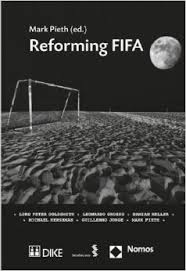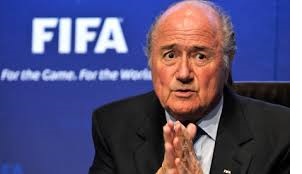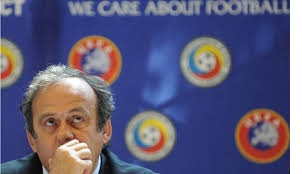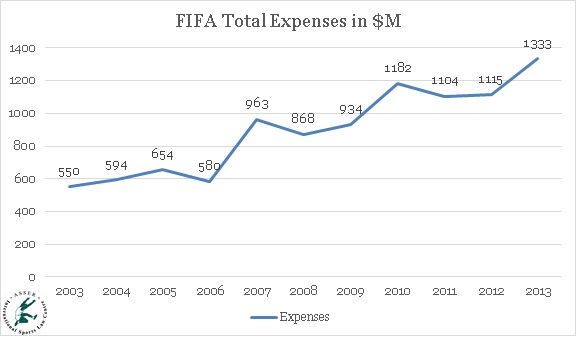Rien ne va plus at FIFA. The news that FIFA’s Secretary General Jérôme Valcke
was put on leave and released from his
duties has been quickly overtaken by the opening of a criminal investigation targeting
both Blatter and Platini.
With FIFA hopping from one scandal to the next, one
tends to disregard the fact that it has been attempting (or rather pretending) to
improve the governance of the organisation for some years now. In previous
blogs (here and here), we
discussed the so-called ‘FIFA Governance Reform Project’, a project carried out
by the Independent Governance Committee (IGC) under the leadership of Prof. Dr.
Mark Pieth of the Basel Institute on Governance. Their third and final report, published
on 22 April 2014, listed a set of achievements made by FIFA in the area of good
governance since 2011, such as establishing an Audit and Compliance Committee (A&C).
However, the report also indicated the reform proposals that FIFA had not met.
These proposals included the introduction of term limits for specific FIFA
officials (e.g. the President) as well as introducing an integrity review
procedure for all the members of the Executive Committee (ExCo) and the
Standing Committees. More...
Editor’s
note: Chuck Blazer declined our official interview request but thanks to some trusted
sources (the FIFA indictment and
Chuck’s testimony) we
have reconstructed his likely answers. This is a fictional interview. Any resemblance with real facts is purely coincidental.

Mr
Blazer, thank you for agreeing to this interview, especially considering the
circumstances. How are you doing?
I am facing ten charges concerning, among others,
conspiracy to corrupt and money laundering. But apart from that, I am doing
great (laughs)!
It is
good to know that you have not lost your spirit. And since you’ve been involved
in football, or as you call it soccer, for years could you please first tell us
what was your career at FIFA and its affiliates like?
Let me see… Starting from the 1990s I was employed by and
associated with FIFA and one of its constituent confederations, namely the
Confederation of North, Central American and Caribbean Association Football (CONCACAF).
At various times, I also served as a member of several FIFA standing
committees, including the marketing and television committee. As CONCACAF’s
general secretary, a position I proudly held for 21 years, I was responsible,
among many other things, for negotiations concerning media and sponsorship
rights. From 1997 to 2013 I also served at FIFA’s executive committee where I
participated in the selection process of the host countries for the World Cup
tournaments. Those years at the helm of world soccer were truly amazing years
of travel and hard work mainly for the good of the beautiful game. I might add
that I even managed to document some of my voyages on my blog. I initially
called it “Travels with Chuck Blazer” but Vladimir (Putin) convinced me to
change the name to “Travels
with Chuck Blazer and his Friends”. You should check it out.
More...
Editor’s note: This short book review will be
published in a different format in the International Sports Law Journal, due to
its timeliness we decided to reproduce it here.
Reforming
FIFA, or Not
Antoine Duval
Book Review: Mark Pieth
(ed.), Reforming
FIFA, Dike Verlag, St. Gallen, 2014, 28.00 CHF, p.178

This
book looks back at the work of the Independence Governance Committee
(IGC). This Committee, constituted in 2011, had as
primary objective to drive a reform process of FIFA initiated by its President
Sepp Blatter. After ordering from the Swiss anti-corruption expert Mark Pieth,
a report
on the state of FIFA’s governance, FIFA decided to mandate him with the leadership
of a consulting body composed of a mix of independent experts and football
insiders, which would be accompanying and supervising the internal reform
process of FIFA. The IGC was officially dissolved
at the end of 2013, after completing its mandate. The book is composed of eight
chapters, written by former members of the IGC, including former chairman Mark
Pieth. In addition to the chapters, it includes the different reports
(available here,
here
and here)
submitted by the IGC to FIFA across the years. In the words of Pieth, this
account is “fascinating because it gives a hands-on, realistic perspective of
the concrete efforts, the achievements and the remaining challenges in the
struggle for the reform of this organization [FIFA], avoiding the usual
glorification or vilification.”[1]
This review will first summarize the core of the account of the FIFA reform
process provided by the book, before critically engaging with the outcome of
the process and outlining the deficiencies that culminated on 29 May 2015 with
the re-election of Sepp Blatter as FIFA president.More...
'Can't fight corruption with con tricks
They use the law to commit crime
And I dread, dread to think what the future
will bring
When we're living in gangster time'
The Specials - Gangsters
The pressing need for change
The
Parliamentary Assembly (PACE) of the Council of Europe (CoE), which is composed
of 318 MPs chosen from the national parliaments of the 47 CoE member states,
unanimously adopted a report entitled ‘the reform of
football’
on January 27, 2015. A draft resolution on the report will be debated during the
PACE April 2015 session and, interestingly, (only?) FIFA’s president Sepp
Blatter has been sent an invitation.
The PACE report
highlights the pressing need of reforming the governance
of football by FIFA and UEFA respectively. Accordingly, the report contains
some interesting recommendations to improve FIFA’s (e.g., Qatargate[1]) and
UEFA’s governance (e.g., gender representation). Unfortunately, it remains unclear
how the report’s recommendations will actually be implemented and enforced.
The report is a
welcomed secondary effect of the recent Qatargate directly involving former
FIFA officials such as Jack Warner, Chuck Blazer, and Mohamed Bin Hammam[2] and
highlighting the dramatic failures of FIFA’s governance in putting its house in
order. Thus, it is undeniably time to correct the governance of football by FIFA
and its confederate member UEFA – nolens
volens. The real question is how to do it.


Photograph:
Fabrice Coffrini/AFP/Getty Images Photograph:
Octav Ganea/AP
More...
After Tuesday’s dismissal of Michael Garcia’s complaint
against the now infamous Eckert statement synthetizing (misleadingly in his
eyes) his Report on the bidding process for the World Cup 2018 and 2022, Garcia
finally decided to resign from his position as FIFA Ethics Committee member. On his way out, he
noted: “No independent governance committee, investigator, or arbitration panel
can change the culture of an organization”. It took Garcia a while to
understand this, although others faced similar disappointments before. One
needs only to remember the forgotten reform proposals of the Independent Governance
Committee led by Prof. Dr. Mark Pieth. More...
Our first report on the FIFA business dealt with FIFA’s revenues and highlighted
their impressive rise and progressive diversification. In parallel to this
growth of FIFA’s income, it is quite natural that its expenses have been
following a similar path (see Graph 1). However, as we will see FIFA makes it
sometimes very difficult to identify precisely where the money is going. Nonetheless,
this is precisely what we wish to tackle in this post, and to do so we
will rely on the FIFA Financial reports over the last 10 years.

Graph 1: FIFA Expenses in USD million (adjusted for inflation),
2003-2013.
More...